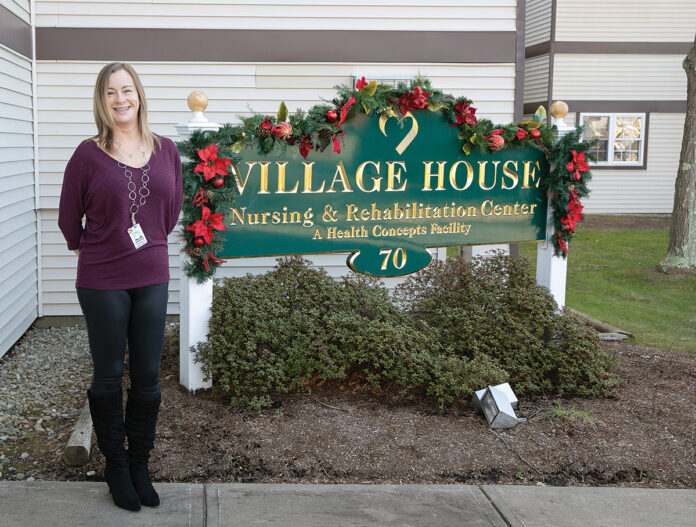Jennifer Romagnolo is used to paying her bills on time – both in her personal life and in her role as administrator for the past 10 years at the Village House Nursing & Rehabilitation Center in Newport.
But like many long-term care facilities in Rhode Island, and the country, Village House is struggling to make ends meet, she said, and it closed out 2020 with nearly a $400,000 loss.
Romagnolo contends a state regulation yet to go into effect could make the financial situation worse at Village House, which is owned by Providence-based Health Concepts Ltd., and at many other Rhode Island nursing homes.
In December, the R.I. Department of Health started drafting an emergency regulation on minimum staff-to-patient ratios in nursing homes. The regulation would require 3.8 staff hours per resident per day for nurses, certified nursing assistants and other direct-care workers.
Health department spokesman Joseph Wendelken told Providence Business News recently that the department is still “working through the details.”
Wendelken said most facilities in the state are meeting the needs of residents, but the emergency regulation would bring more structure and consistency to the resident-to-worker-hours ratio across the state, and he said it would ensure that workers have adequate support.
‘I can guarantee that other homes will close because of this regulation.’
JENNIFER ROMAGNOLO, Village House Nursing & Rehabilitation Center administrator
However, the regulation would put an extra financial burden on struggling nursing homes, according to industry leaders.
For Romagnolo, it would mean hiring another six to eight direct-care workers – at the cost of about $20,000 a month in salaries. She said the additional staff isn’t necessary.
“We have the proper number of employees to care for our residents in our nursing department, and they provide quality care,” said Romagnolo, who said 76 of Village House’s 95 beds are filled. Nearly half of them are Medicaid patients. Low Medicaid reimbursement rates means the nursing home is losing about $9 to $12 per patient per day.
With COVID-19 cases continuing to surge, labor unions representing nursing home workers had stepped up lobbying efforts to get the state to implement the staffing-level requirement. A failed bill introduced last year proposed a daily average of 4.1 hours of direct nursing care per resident.
“Nursing home heroes and our state’s most vulnerable citizens have been the victims of dangerously low short staffing for decades – the pandemic is pushing them to a breaking point,” said Adanjesus Marin, coordinator of Raise the Bar on Resident Care, a union-backed coalition. “There is a direct correlation between staffing levels and infection-control violations, yet the industry continues to claim they are powerless to stop the spread.”
He added, “It is time our elected officials hold industry leaders accountable to keep nursing home residents and caregivers safe, as their lives are put at risk daily.”
There’s no date set when the regulation could go into effect, but industry advocates say they are worried about many nursing homes shutting their doors because of the financial pressure that would be created by the mandated staffing ratio.
James Nyberg, director of LeadingAge RI, which represents 14 nonprofit facilities that offer care for older people, said he is opposed to the regulation.
In a letter addressed to Gov. Gina M. Raimondo and Health Director Dr. Nicole Alexander-Scott in early December, Nyberg joined Scott Fraser, CEO and president of the Rhode Island Health Care Association, and David Bodah, executive director of the Rhode Island Assisted Living Association Inc., in denouncing the staffing-level requirement.
They argued that there is no pool of workers for facilities to hire from to meet the more stringent requirement. And even if there were plenty of people to hire, “our homes do not have the extra funds to pay for this,” the letter said.
“We hear the governor imploring people to work at the field hospitals that have opened up, but where does she expect people to materialize to help a nursing home meet the [3.8-hour] requirement? There is a real disconnect there,” Nyberg told PBN.
Fraser said the regulation setting 3.8 staff hours per resident per day would be the highest mandate of the 25 states that have some type of mandatory staffing level.
“It’s not just a matter of if a home closes, but it’s where do you find places for these folks to be cared for,” said Fraser.
Back at Village House in Newport, Romagnolo said her facility has largely kept COVID-19 out of the building, reporting between two to four cases since March.
If the staffing regulation goes into effect, she said she will have to compete with the other long-term-care facilities to hire additional high-quality employees.
“These additional monthly losses won’t be sustainable,” said Romagnolo, who noted that Village House wages start at $16 an hour for CNAs with no experience and about $18 an hour for CNAs with experience, with a 3% raise each year. “I can guarantee that other homes will close because of this regulation,” she said.













